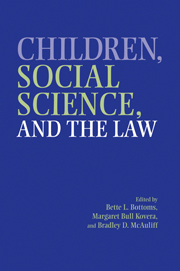Book contents
- Frontmatter
- Contents
- Acknowledgments
- Contributors
- 1 Children, Social Science, and the Law: An Introduction to the Issues
- PART I CHILDREN'S RIGHTS, THEIR CAPABILITIES, AND SOCIETY'S RESPONSIBILITIES TO CHILDREN
- PART II CHILDREN AND FAMILY CHANGE
- PART III JUVENILE AGGRESSION AND JUVENILE JUSTICE
- PART IV CHILDREN AS VICTIMS AND WITNESSES
- PART V CONCLUSIONS AND FUTURE DIRECTIONS
- Author Index
- Case Index
- Subject Index
- References
1 - Children, Social Science, and the Law: An Introduction to the Issues
Published online by Cambridge University Press: 24 July 2009
- Frontmatter
- Contents
- Acknowledgments
- Contributors
- 1 Children, Social Science, and the Law: An Introduction to the Issues
- PART I CHILDREN'S RIGHTS, THEIR CAPABILITIES, AND SOCIETY'S RESPONSIBILITIES TO CHILDREN
- PART II CHILDREN AND FAMILY CHANGE
- PART III JUVENILE AGGRESSION AND JUVENILE JUSTICE
- PART IV CHILDREN AS VICTIMS AND WITNESSES
- PART V CONCLUSIONS AND FUTURE DIRECTIONS
- Author Index
- Case Index
- Subject Index
- References
Summary
As noted by Goodman, Emery, and Haugaard (1998), “there are few other areas of law where the courts rely as heavily on social science data as they do for decisions about children's welfare” (p. 775). The primary goal of Children, Social Science, and the Law is to facilitate that reliance. We believe researchers in this field have an obligation to understand child-relevant law and policy so that they are prepared to conduct research that is useful to courts, policy makers, and practitioners. Legal professionals and practitioners must then understand and use that research. We designed our book specifically to help both groups of professionals meet these critical responsibilities and, in turn, improve children's quality of life under the laws and policies of the United States.
Children, Social Science, and the Law broadens the field's conceptualization of the topic “children and the law” in ways not attempted previously, raising consciousness about a wide-ranging set of issues in great need of theoretical, empirical, and legislative attention. Some chapters address the newest research in subfields that fortunately have burgeoned over the last decade (e.g., children's eyewitness testimony, child abuse and neglect). Other chapters are in-depth considerations of novel issues that have received far less attention than they deserve (e.g., the impact of welfare policies on children, law and policy related to gay and lesbian parenting).
- Type
- Chapter
- Information
- Children, Social Science, and the Law , pp. 1 - 12Publisher: Cambridge University PressPrint publication year: 2002
References
- 1
- Cited by



